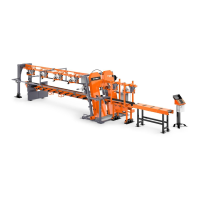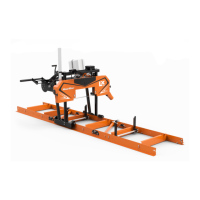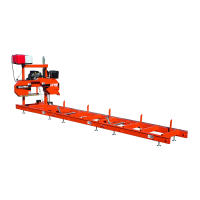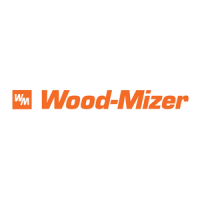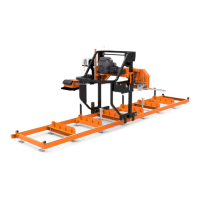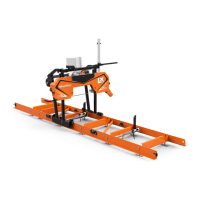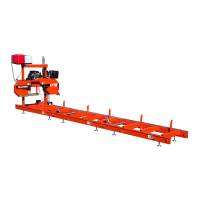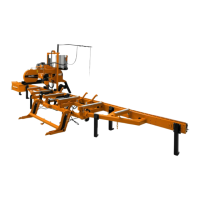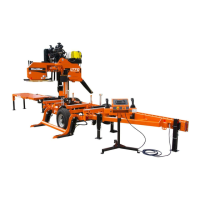Do you have a question about the Wood-mizer Titan WB2000-EC and is the answer not in the manual?
Overview of the WB2000EC sawmill and its intended use for sawing wood.
Details on sawmill delivery, installation, and major component identification.
Crucial safety instructions for handling bandsaw blades and disengaging the motor.
Safety warnings regarding securing the sawmill to the ground and blade tension.
Safety warnings for operating the sawmill, including guards, moving parts, and clear paths.
Precautions for operation, including clothing, clamping logs, lube systems, and emergency stops.
Safety guidelines for blade handling, extraction systems, and laser radiation.
Explains pictographic safety decals related to manual reading, guards, and blade tension.
Details safety decals for keeping distance, debarker blade, and electric box safety.
Decals for eye protection, ear protection, safety boots, lubrication, and blade alignment.
Decals for CE sign, Russian certification, and motor rotation direction.
Introduction to the WB2000EC control box and its purpose for minimal operator effort.
Details of the operator's stand, including touch screen, control panels, and electric box.
Explanation of main switch, guard, touch screen, buttons, and indicator lights.
Step-by-step instructions for safely changing the sawmill blade, including safety warnings.
Procedure for adjusting blade tension using the tension handle and oil flow control valves.
Steps for positioning and tracking the blade on the blade wheels, including cant adjustment.
Completing blade tracking, checking guards, and re-checking tracking after adjustments.
Essential conditions for using the sawmill, including extraction systems and lighting.
Diagrams showing protective fences, log loading areas, and operator work-places.
Details on power supply requirements, electrician installation, and GFI usage.
Information on lifting the machine using forklift pockets or winches.
Procedure for turning on the machine and the initial welcome screen display.
Configuring machine settings via the SETUP button, including Kerf, Bump, and Limits.
Explanation of Trigger, Automatic Set, Automatic Bump, and Automatic Return functions.
Procedure for calibrating the forward/backward feed for accurate head positioning.
How to change measurement units (Metric/Imperial) and language settings.
Adjusting parameters for up/down feed distances and speeds, password protected.
Configuring memory for Reference mode, setting board sizes and decimal values.
Setting up programs for Stack mode cutting, including program numbers and sizes.
Using Reference Mode Down for cutting from top to bottom, considering kerf value.
Sample operation for Reference Mode Down, selecting board thickness and cutting.
Procedures for reaching log end, Automatic Bump, and Automatic Return functions.
Cutting from top to bottom without board removal, accounting for kerf.
Sample operation for Reference Mode Down with return height, selecting board thickness.
Details on return height, Automatic Bump, and Automatic Return functions in this mode.
Cutting from bottom to top, accounting for kerf value without board removal.
Sample operation for Reference Mode Up, selecting board thickness.
Procedures for log end handling and automatic functions in Reference Mode Up.
Cutting from bottom to top without board removal, accounting for kerf.
Sample operation for Reference Mode Up with return height, selecting board thickness.
Details on return height and automatic functions in Reference Mode Up.
Performing series of cuts from the log bed, calculating board quantities.
Example of creating a cutting program in Stack mode for specific board sizes.
Operating the saw head in Stack mode and modifying program parameters.
Performing cuts in Stack mode with return height functionality.
Example operation for Stack Mode with return height, setting saw head position.
Details on automatic functions in Stack Mode with return height.
Information on error indicators, messages, and inverter malfunction windows.
Displaying alarm windows, error descriptions, causes, and recommended actions.
Details on communication errors and messages displayed at the bottom of the screen.
Using the DIAGNOSTIC button to check machine system inputs and outputs.
Using Bypass mode to operate the saw head when the PLC is damaged.
Estimated life expectancy of common replacement parts like motors and belts.
Instructions for dismounting blade wheel covers for cleaning and maintenance.
Instructions for accessing debarker and blade drive belt covers for cleaning.
Details on accessing and cleaning the blade drive belt cover.
Checking and adjusting feed chain tension, with a caution against overtightening.
Lubricating the feed chain with oil and inspecting drive system components.
Steps for checking and realigning the conveyor belt using adjustment bolts.
Inspection of E-STOP button, circuit, and control circuits with E-STOP pressed.
Inspecting blade cover safety switches and motor brake functionality.
Using a level and leg adjustment bolts to level the bed frame along its length.
Using a level and leg adjustment bolts to level the bed frame across its width.
Leveling the saw head mast in the horizontal plane using adjustment bolts.
Adjusting mast rollers and dismounting scraper brackets for alignment.
Ensuring the saw head is level by measuring blade guide distances.
Checking and adjusting up-down system rollers for proper contact with the mast.
Using an alignment tool to check and adjust the vertical tilt of blade wheels.
Detailed steps for adjusting the vertical tilt of the drive-side blade wheel.
Detailed steps for adjusting the vertical tilt of the idle-side blade wheel.
Adjusting blade position on wheels and using cant control for idle-side adjustment.
Adjusting blade position on the drive-side wheel and final checks.
Adjusting blade guide arm position and horizontal tilt.
Adjusting blade guide blocks to deflect the blade correctly and checking contact.
Adjusting bed rails for proper alignment using locking and adjustment bolts.
Final adjustment of remaining bed rails using a rope for alignment.
Adjusting side supports to stop at upper and lower limits simultaneously.
Specifications for the motor drive belt, including size and part number.
Details on blade width, length, linear speed, tension system, and lubrication.
Log size capacities including minimum/maximum diameter and length based on frame type.
Power options for main motors and specifications for other motors like Up/Down and Power Feed.
Average noise level measurement according to ISO standards.
Dimensions and weight specifications for different WB2000 models.
Load capacity of the Up/Down chains according to ISO standards.
Technical details of the dust extractor system, including capacity and pressure.
Specifications for the blade lubricating oil, including temperature and manufacturer.
Technical data and safety class for the laser line generator.
Maintenance intervals for service brakes and important notes on brake replacement.
Procedures for checking rotor thickness and air gap, and comparison with permissible values.
| Engine Type | Electric |
|---|---|
| Engine Power | 30 kW |
| Weight | 5000 kg |
| Power Source | Electric |
| Max Log Diameter | 1.7 m |
| Max Cant Width | 1.5 m |
| Feed System | Variable Speed |
| Log Diameter | 1.7 m |
